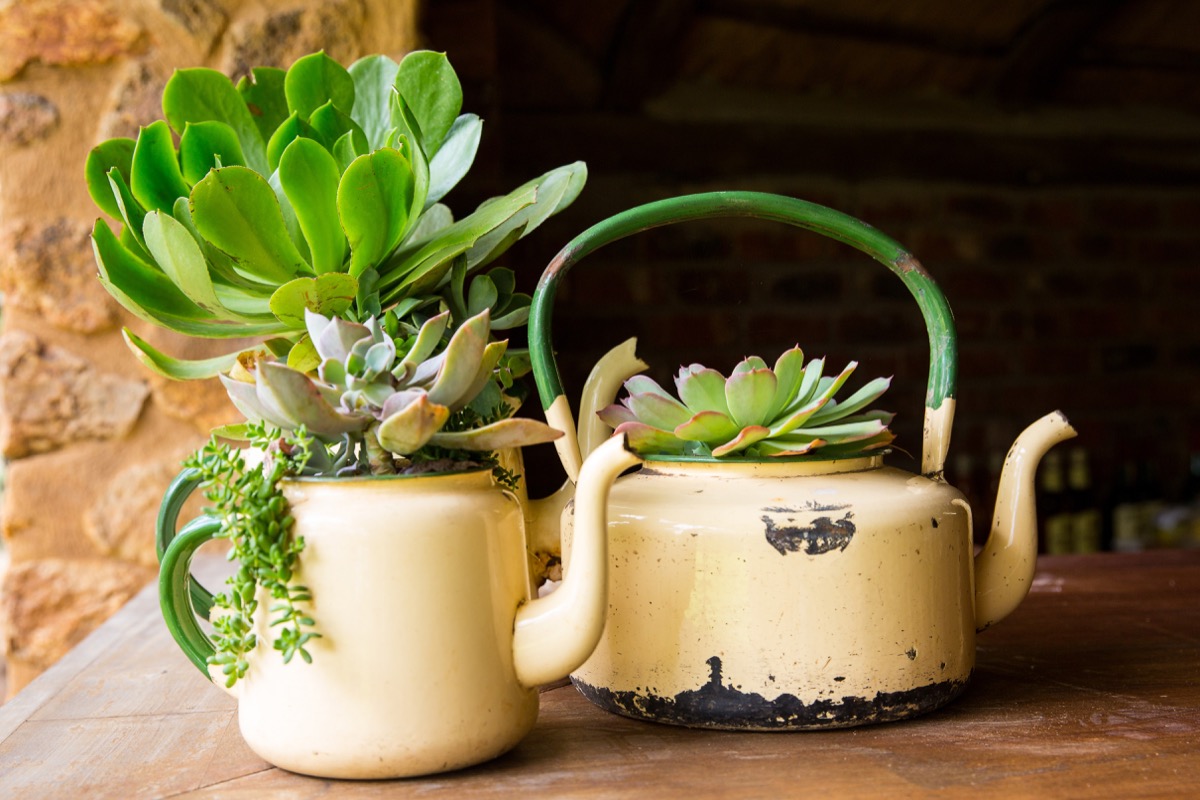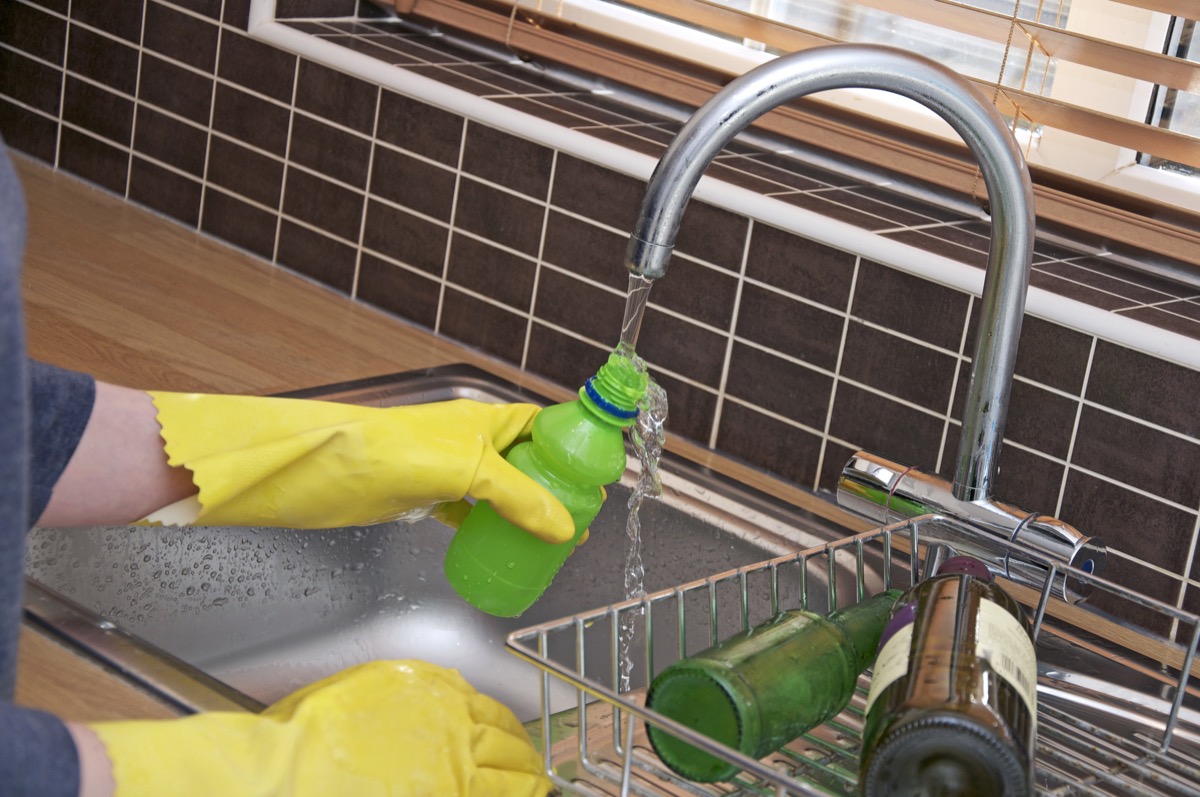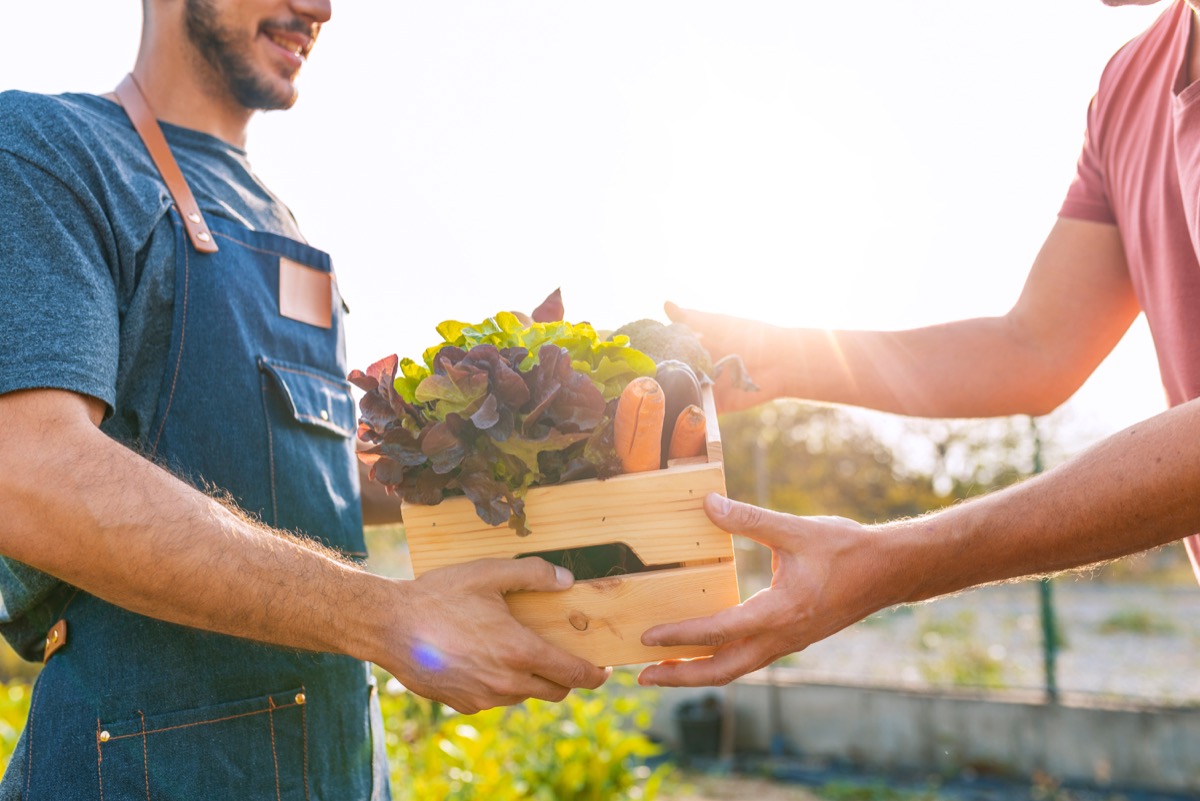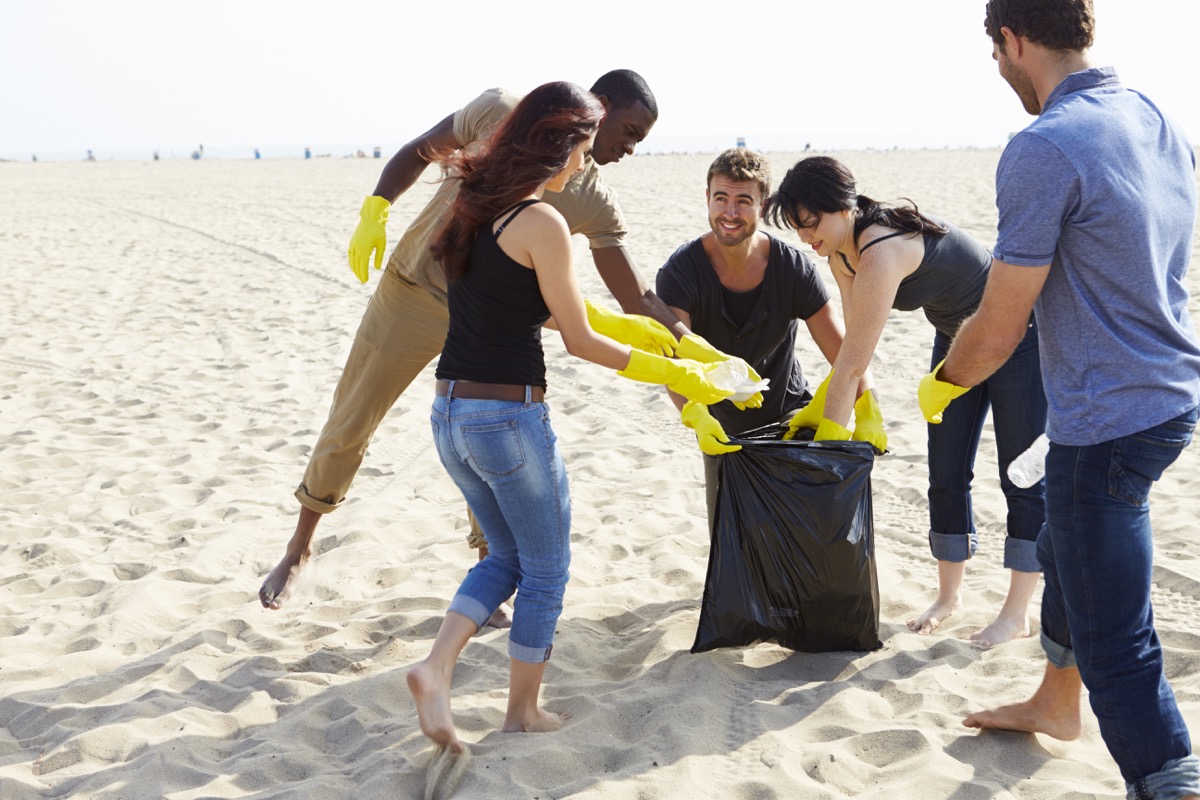
While "reduce, reuse, recycle" is repeated in today's classrooms right along with the ABCs, it wasn't until relatively recently that eco-consciousness moved out of the fringe and into the mainstream. To people who didn't grow up separating their recyclables or composting in their kitchen, the process of going green can feel like a bit of a mystery. But there's hope! To get you started, we've compiled 21 simple ways to help the environment, all based on advice from sustainability experts.
1
Use sustainable bathroom products.

Have you ever noticed how much plastic packaging is in your bathroom? According to Johnson & Johnson, "The number of shampoo bottles thrown out in the United States every year could fill 1,164 football fields." To combat this waste, sustainability-focused companies like Odacite and The Detox Market have created shampoo bars, reusable cotton rounds, and reusable facial cleansing sponges. By purchasing reusable or sustainably created products, you're mitigating your negative impact on the Earth and saving money.
2
Up-cycle your belongings.

"Not everything needs to be purchased. Craft what you can," suggests Galina Witting, sustainability expert and co-founder of Baabuk. While Marie Kondo-ing your closet can be appealing, perhaps you shouldn't be so quick to throw your things away. "The landfill is no place for items that still have life," says Witting. If you cannot repurpose or mend an item, be sure to recycle or donate it.
3
Start composting.

While composting can feel overwhelming to newbies, sustainability blogger Jen Panaro says there are ways for just about anyone to compost (which means recycle organic material). "Composting reduces municipal waste languishing in landfills, significantly cuts down on greenhouse gas emissions that lead to global warming, and replenishes the soil," says Panaro. Once you start composting, you'll never look back—it's just as easy as throwing your food away.
4
Work from home whenever possible.

While this might not feel especially appealing while in quarantine, working from home is great for the environment. If you drive, ditching your commute means fewer cars on the road and fewer individual carbon footprints. Jeremy Scott Foster founder of the travel site 'Travel Freak' pointed to a BBC report on how pollution levels in China dropped overnight as a result of the quarantine implemented in the country. Working from home even a couple of days a week could have a significant positive impact on the environment.
5
Eat a more plant-based diet.

Want to make both your body and the world healthier? Ditch some of those meat-based meals for ones packed with plants. Meat consumption is linked to everything from heart disease to colon cancer, and producing meat costs us a huge amount of valuable resources.
"Food is one of the single largest ways we can reduce the land, water, and resources required for supporting our lifestyles on Earth," says sustainability professional Leslie Ng, MBA, a business coach for eco-conscious entrepreneurs. "Food represents nearly 50 percent of the consumption-based emissions we generate."
6
Use induction cooking.

While gas ovens have a reputation for cooking things more evenly than their electric counterparts, induction stoves can save you time and energy in the kitchen—and can help save the planet, too. "Choosing electric induction cooking over gas can not only be more energy efficient, but it can actually lead to better air quality and is generally safer," says Ng.
She notes that a typical induction cooktop is 84 percent efficient, while a gas range is only about 40 percent efficient, according to the U.S. Department of Energy.
7
Check for leaks and drafts regularly.

You don't have to venture out into the world to help the Earth. In fact, you can make your life greener with just a few simple changes at home. Start by checking your house for drafts and leaks. If you find any, get rid of them by caulking around windows and fixtures, using draft protectors under your doors, or insulating around pipes. This will help your home become more energy efficient thereby reducing your carbon footprint.
8
Turn off the tap between shampooing and conditioning.

If you're used to taking long, hot showers, you're not doing Mother Earth any favors. To really benefit the planet, you should turn off the water between steps one (lather) and two (rinse) of your hair washing routine.
"There's a lot of energy that went into treating your water, then getting it to you, and heating it up for your shower, only to spend nanoseconds on your body before going down the drain again," says Ng. "It's not only about water conservation, but all the energy that went into you getting a hot shower."
9
Plant more.

A well-manicured lawn may look nice, but opting for a garden or planting trees will yield more benefit for the environment in the long run.
"Put in native trees, shrubs and flowering plants. By doing this, you'll restore the ability of your garden to absorb rainfall and soak it into the ground," says Maya K. van Rossum, the original organizer of the Green Amendment Movement and author of The Green Amendment: Securing Our Right to a Healthy Environment. In doing so, "you will also create a beautiful and healthy habitat for butterflies, birds, and other local wildlife, enriching your lives and theirs," Van Rossum says.
10
Use a clothesline.

Making this change will also help save you money. Ditch that tumble dryer in favor of a clothesline. Electric dryers eat up a huge chunk of your home electricity. According to The Spruce, "Air-drying clothes can reduce the average household's carbon footprint by a whopping 2,400 pounds a year."
11
Use heat pumps in your home.

Keeping your home warm in the winter and cool in the summer may be a non-negotiable, but oil and gas heating and traditional air conditioners eat up a ton of energy and contribute to greenhouse gas emissions.
"Making sustainable energy choices contributes to slowing down climate change. You can do that by switching away from fossil fuels—oil, gasoline, natural gas, and propane—to energy efficiency and renewable energy," explains Matt Daigle, CEO and founder of sustainable building company Rise. "A great and easy way to do this is to invest in a heat pump. Heat pumps can reduce the amount of energy needed to heat and cool your home and reduce or even limit your reliance on fossil fuels."
12
Use water saving technology.

While turning off the tap while you brush your teeth or taking shorter showers is a great place to start, if you really want to reduce your water consumption, replacing some of your fixtures is a great place to start.
"Look for easy, inexpensive ways to reduce your usage, such as finding EPA Water Sense-labeled fixtures and low flow faucets and toilets. Toilets are the single largest water user in a household, accounting for up to 30 percent of household water use, so installing a more efficient toilet is your best way to reduce your water consumption," adds Daigle.
13
Insulate your electrical outlets.

You may not give something as small as your electrical sockets a second thought, but they are likely letting in a lot of air. "Put your hand over an electrical outlet on an outside wall on a cold night, and you'll feel the rush of frigid air," points out Shel Horowitz author of Painless Green. Horowitz suggests people insulate electrical outlets, switches, and phone jacks on outside walls, which may result in you needing less heat in your home. You can find inexpensive foam outlet insulation pads at most hardware stores.
14
Wash your recyclable plastics.

Tossing containers with food still on them directly into the recycling bin can cause serious environmental harm—so when in doubt, rinse it out. "Wash recyclable plastic food containers prior to recycling them; contamination can render entire batches of recyclables un-recyclable," says Kaméa Chayne, host of the sustainability podcast Green Dreamer.
15
Drive on sunshine.

If you have an electric car, you can make your sustainable driving even more impactful by seeking out solar-powered charging stations to power up your car. Transportation and the generation of electricity account for almost 60 percent of greenhouse gas emissions in the U.S., according to the EPA. "Driving on sunshine wipes out both contributors," says Desmond Wheatley, president and CEO of Envision Solar International.
16
Buy eco-friendly pet products.

Often, we unwittingly subject our pets to products we don't realize are unethical. Next time you're shopping for pet food or accessories, be sure to do some research. For example, many traditional cat litters are surprisingly harmful to the environment. Environmental ecologist Molly Anderson explains, "Clay litter is strip-mined from otherwise pristine natural environments, killing native wildlife, ruining their habitat, and dumping tons of silt into rivers and the ocean, where it chokes aquatic life and further destroys the ecosystem." Cat owners should consider switching to eco-friendly litter to keep the Earth clean for themselves and their pets.
17
Use eco-friendly toilet paper.

Toilet paper of any kind may be a hot commodity right now, but if you have the choice, consider an eco-friendly option. "Choosing toilet paper is an often-overlooked climate decision, especially given that each American uses nearly three rolls per week," says Jeff Salzgeber of the Natural Resources Defense Council (NRDC). "Canada's boreal forest stores nearly twice as much carbon as all the world's oil reserves combined, yet is being clearcut at a rate of one million acres a year, in part to feed consumers' demand for toilet paper," he says. Consult the NRDC's rating of common toilet paper brands' sustainability for more information.
18
Borrow more, buy less.

One of the oldest institutions in America can teach us an invaluable lesson in sustainability. Take a note from the library and start looking for other opportunities to borrow, once it is safe to, of course. "Borrowing preserves Earth's precious (and finite) resources; it prevents our homes from being overwhelmed with clutter, too," says Stephanie Seferian host of The Sustainable Minimalists podcast. Seferian suggests extending the borrower's mindset to every area of your life: "Don't spend money on a garment you will wear once or twice: borrow from a friend or rent from Rent the Runway. Does your daughter need a softball glove? Borrow from someone in your community, then return when the season is done." She also suggests arranging borrowing events with friends, such as toy or clothing swaps.
19
Eat locally sourced food.

Have you ever considered all the miles food travels to get to supermarket shelves? While our current situation may make this a challenge, Seferian suggests that you "forego items grown thousands of miles away that travel for days on refrigerated, diesel-burning trucks." This may sound limiting, but it actually opens up many great alternatives. Seferian's tip is to "limit food to a 200 mile radius by joining local farm's CSA program, frequenting the farmer's market, and eating the foods in season for your climate."
20
Only buy from companies that share your values.

Unnecessary packaging is easily one of the most waste-producing traditions in America. While it may be a challenge right now, when shopping online, try to find a company that has the same values as you. Seek out companies, such as Misfits Market and Root'd, that are committed to creating sustainable products and packaging. Root'd "has pledged to make their product 100 percent plastic-free and bio-compostable within the next decade," according to their site. Until then, their team is planting millions of trees and cleaning up 10 million pounds of plastic from the Earth and oceans. By only supporting companies who have eco-friendly packaging habits and sustainable business practices, you are redirecting what is considered acceptable by consumers. "I think a little extra research before purchasing will go a long way toward positively impacting our planet," says Michael Cammarata, president and CEO of Neptune Wellness Solutions.
21
Talk about sustainability with others.

Fill your life with people who also want to help the Earth and do eco-friendly activities together, once the lockdown is lifted, of course. Start a community garden, do a beach cleanup, or host a club with friends. "We all need the support of community. We need to gather with like-minded people to be seen and heard in our concerns for the Earth, so we can band together and move in the power of a group," says professional surfer and environmental activist Lauren Hill.
Additional reporting by Sarah Crow.





















